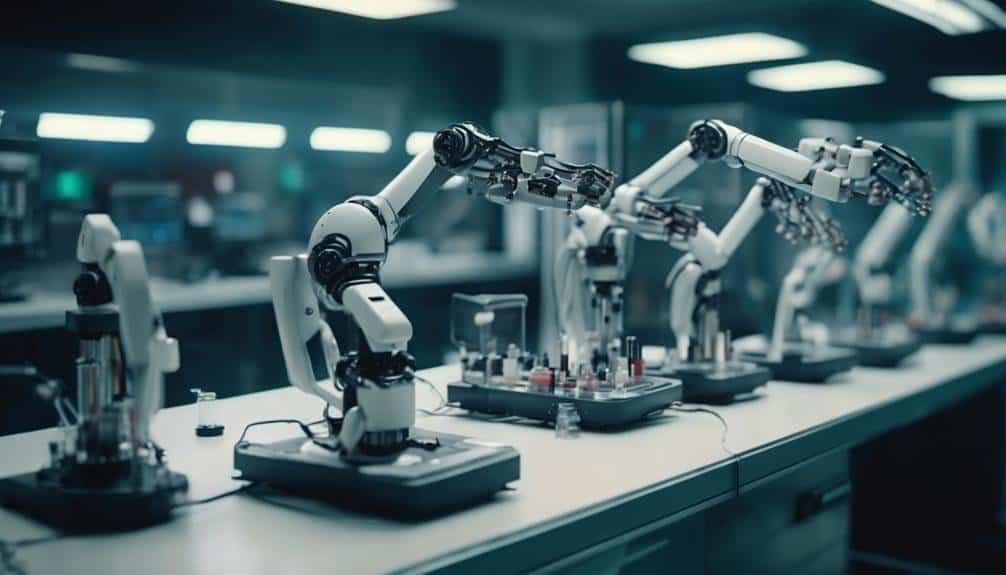AI in Biotechnology: Revolutionizing Research and Development
The integration of artificial intelligence (AI) in biotechnology has brought about a paradigm shift in the field of research and development. From expediting drug discovery processes to enabling personalized healthcare solutions, the potential of AI in biotech is vast and transformative.
As AI continues to evolve, its applications in biotechnology are reshaping the landscape of innovation and scientific breakthroughs. Stay tuned to explore how AI is revolutionizing the biotech industry and paving the way for a future where technology and biology converge to drive unprecedented advancements.
Key Takeaways
- AI expedites drug discovery and development processes.
- Precision medicine tailors treatments based on genetic profiles.
- Automation enhances bioprocessing efficiency and accuracy.
- Data-driven biomarker discovery accelerates research in biotechnology.
AI-Powered Drug Discovery
AI-powered drug discovery has emerged as a transformative approach in the field of biotechnology, utilizing advanced algorithms and machine learning to expedite the identification and development of novel pharmaceutical compounds. Through the integration of AI algorithms, drug repurposing strategies have gained momentum within the industry. This methodology involves the identification of existing drugs that can be repurposed for new therapeutic uses, thus potentially reducing time and costs associated with traditional drug development processes.
Moreover, AI technologies play a crucial role in target identification, a fundamental step in drug discovery. By analyzing vast amounts of biological data, AI can predict potential drug targets with higher accuracy and efficiency compared to conventional methods. Virtual screening, another key application of AI in drug discovery, involves the computational screening of large compound libraries to identify molecules with the highest likelihood of binding to the target of interest.
Precision Medicine Advancements
The advancement of precision medicine has brought about significant benefits through genetic testing, enabling tailored treatment options based on individual genetic profiles.
This personalized approach allows for more effective and targeted therapies, minimizing potential side effects and improving patient outcomes.
Genetic Testing Benefits
Advancements in precision medicine have unlocked significant benefits through genetic testing, allowing for tailored treatment approaches based on individual genetic profiles. Genetic testing offers a range of advantages in the field of biotechnology, particularly in precision medicine.
- Early Disease Detection: Genetic testing can identify genetic markers associated with diseases even before symptoms manifest.
- Personalized Treatment Plans: Results from genetic tests enable healthcare providers to customize treatment strategies based on an individual's genetic makeup.
- Family Health Assessment: Genetic testing provides insights into familial health risks, aiding in preventive care for relatives.
- Clinical Trial Eligibility: By analyzing genetic markers, patients can be matched with relevant clinical trials, promoting personalized healthcare interventions.
Personalized Treatment Options
Genetic testing's ability to provide tailored treatment approaches based on individual genetic profiles has paved the way for significant advancements in precision medicine, particularly in the realm of personalized treatment options. This approach allows for the development of targeted therapies that focus on specific genetic mutations or biomarkers present in a patient.
By analyzing genetic information, healthcare providers can offer patient-specific treatments that are more effective and have fewer side effects. Precision medicine aims to optimize treatment outcomes by considering each individual's unique genetic makeup, lifestyle, and environment.
This personalized approach not only enhances patient care but also contributes to the advancement of medical research and the development of innovative treatment strategies.
Enhancing Bioprocessing Efficiency
Bioprocessing efficiency in biotechnology is increasingly being enhanced through automation, which streamlines processes and reduces human error.
Data-driven optimization plays a crucial role in fine-tuning bioprocessing methods to achieve higher yields and improved product quality.
The integration of AI technologies in bioprocessing is paving the way for more efficient and cost-effective production processes in the biotechnology industry.
Automation in Bioprocessing
In the realm of biotechnology, the integration of automation systems has significantly elevated the efficiency of bioprocessing operations. Bioprocessing automation has brought about notable advancements in the industry, primarily through:
- Enhanced Productivity: Automation streamlines processes, leading to increased output and faster production cycles.
- Improved Quality Control: AI-driven optimization ensures consistent product quality through real-time monitoring and adjustments.
- Cost Savings: Automation reduces labor costs and minimizes errors, resulting in overall savings for biotech companies.
- Enhanced Process Control: Automation allows for precise control over various parameters, optimizing bioprocessing conditions for maximum efficiency.
The implementation of automation technologies in bioprocessing not only enhances operational efficiency but also paves the way for innovation and growth within the biotechnology sector.
Data-driven Optimization
Efficiency in bioprocessing operations can be significantly enhanced through the implementation of data-driven optimization techniques. By leveraging machine learning algorithms and algorithm optimization, biotechnologists can streamline processes, reduce costs, and improve overall productivity. Machine learning models can analyze vast amounts of bioprocessing data to identify patterns, optimize parameters, and predict outcomes, leading to more efficient production processes and higher yields. Algorithm optimization further refines these models, fine-tuning their performance and ensuring the most optimal results. This data-driven approach not only accelerates research and development but also enhances the quality and consistency of bioprocessing outcomes.
| Data-Driven Optimization | Benefits | Applications |
|---|---|---|
| Machine Learning | Enhanced efficiency | Bioreactor optimization |
| Algorithm Optimization | Cost reduction | Process parameter tuning |
| Data Analysis | Improved productivity | Quality control monitoring |
Accelerated Genetic Engineering
How can the integration of artificial intelligence technologies accelerate the process of genetic engineering in biotechnology research and development?
Accelerated genetic engineering is revolutionizing the field through the following key mechanisms:
- CRISPR Applications: AI is enhancing the precision and efficiency of CRISPR-based gene editing techniques. By analyzing vast amounts of genetic data, AI algorithms can predict the outcomes of CRISPR experiments, leading to more targeted modifications.
- Accelerated Evolution: AI algorithms can simulate evolutionary processes to predict how genetic modifications may affect an organism's traits over time. This accelerated evolution approach enables researchers to design genetic changes that optimize desired outcomes rapidly.
- Gene Editing Optimization: AI tools can suggest the most effective gene editing strategies by analyzing complex genetic interactions. This streamlines the experimental process, reducing trial and error in genetic engineering projects.
- Synthetic Biology Advancements: AI facilitates the design of synthetic biological systems by predicting how genetic components will interact within a living organism. This predictive capability accelerates the development of novel bioengineered products and solutions.
Personalized Healthcare Solutions
Artificial intelligence technologies are revolutionizing personalized healthcare solutions by enhancing the precision and efficiency of medical diagnostics and treatment strategies. AI-driven algorithms enable individualized diagnostics tailored to a patient's unique genetic makeup and medical history, leading to more accurate disease detection and personalized treatment plans. Moreover, the integration of AI in telemedicine platforms allows for seamless remote monitoring of patients, enabling healthcare providers to offer real-time support and interventions.
This integration enhances patient engagement by facilitating continuous communication between patients and healthcare professionals, promoting proactive management of health conditions. Through AI-powered remote monitoring and telemedicine integration, patients can receive timely feedback on their health status, medication adherence, and lifestyle choices, fostering a collaborative approach to healthcare management. By leveraging AI for personalized healthcare solutions, healthcare systems can optimize resource allocation, improve patient outcomes, and ultimately enhance the overall quality of care delivered to individuals.
Automation in Laboratory Workflows
With the increasing demand for streamlined processes and improved data accuracy, the integration of automation technologies in laboratory workflows has become paramount in modern biotechnology research and development. Automation plays a crucial role in enhancing workflow optimization and laboratory efficiency.
Here are key points highlighting the significance of automation in laboratory workflows:
- Increased Speed: Automation reduces manual intervention, leading to faster experiment completion and data generation.
- Enhanced Accuracy: By minimizing human error, automation ensures higher data accuracy and reproducibility in experiments.
- Resource Optimization: Automated workflows help in efficient utilization of resources such as reagents, samples, and time.
- Consistent Results: Automation ensures consistency in experimental conditions, reducing variability and enhancing the reliability of research outcomes.
Incorporating automation in laboratory workflows not only accelerates research processes but also improves the overall quality and reliability of data generated in biotechnology R&D.
Data-Driven Biomarker Identification
The implementation of data-driven approaches in biotechnology research has significantly advanced the identification of biomarkers, leveraging automation benefits to enhance precision and efficiency in this crucial aspect of R&D. Machine learning algorithms play a pivotal role in analyzing vast amounts of biological data to uncover patterns and associations that may indicate potential biomarkers. These algorithms can sift through genomics, proteomics, and metabolomics data to identify correlations that would be challenging for traditional methods to detect. By utilizing machine learning algorithms, researchers can expedite the process of biomarker discovery, leading to more accurate and reliable results.
Biomarker discovery is a complex and intricate process that involves the identification of specific molecules or characteristics that indicate the presence of a particular disease or condition. Data-driven approaches offer a systematic and comprehensive way to analyze diverse datasets, enabling researchers to uncover novel biomarkers with potential diagnostic, prognostic, or therapeutic significance. The integration of machine learning algorithms in biomarker discovery not only accelerates the pace of research but also enhances the accuracy and reliability of the identified biomarkers, ultimately contributing to the advancement of precision medicine.
Future Trends in Biotech AI
An evolving landscape of innovative applications and methodologies is shaping the future trajectory of AI integration in biotechnology. As this integration advances, several key trends are emerging:
- Ethical Implications: With AI playing a more significant role in biotech R&D, ethical considerations regarding data privacy, consent, and potential biases in algorithms are becoming increasingly important. Companies must navigate these issues to maintain public trust and comply with regulations.
- Regulatory Challenges: The rapid evolution of AI technologies poses regulatory challenges for biotech companies. Ensuring compliance with existing regulations while adapting to new advancements requires a delicate balance to foster innovation without compromising safety and efficacy.
- Industry Collaborations: Collaborations between biotech firms, tech companies, and research institutions are essential for harnessing the full potential of AI in biotechnology. Pooling resources, expertise, and data can lead to groundbreaking discoveries and accelerate the development of new therapies and technologies.
- Technology Integration: Integrating AI with other cutting-edge technologies such as blockchain and Internet of Things (IoT) devices holds immense promise for enhancing data analytics, improving decision-making processes, and driving efficiencies in biotech research and development.
Conclusion
In conclusion, the integration of AI in biotechnology has undeniably transformed the landscape of research and development. This technological revolution has paved the way for groundbreaking discoveries and advancements in precision medicine, bioprocessing efficiency, genetic engineering, and personalized healthcare solutions.
As we look towards the future, it is evident that AI will continue to play a pivotal role in shaping the biotech industry. The irony lies in the fact that the very tools designed to enhance human capabilities may ultimately surpass them.







